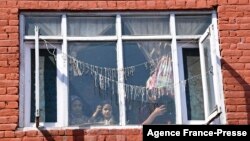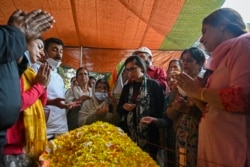A series of militant killings of civilians in Indian-administered Kashmir this month has prompted members of the region’s small Hindu minority to leave the area for fear of further attacks on their community, some residents have told VOA.
“Those who say none of us left [Kashmir] after October 8 are lying,” said Abhay Koul, 24, referring to the date on which he said some families started to depart his gated community of local Hindus, known as Pandits, in the Sheikhpura neighborhood of Budgam district. He spoke while waiting to enter the compound through a gate guarded by Indian police and paramilitary forces.
Eleven civilians have been fatally shot by militants since October 2, according to local authorities. The total includes two Pandits, four non-Kashmiri Hindu migrant workers, one minority Sikh, one Muslim migrant worker and three local Muslims.
The Resistance Front (TRF), an Islamist militant organization believed to be an offshoot of the Pakistan-based Lashkar-e-Taiba, claimed responsibility for most of the attacks.
The Associated Press reported that TRF claimed in a social media post that it was targeting people working for Indian authorities. It said the group’s statement could not be independently verified.
Koul said most of the apartments inside the Pandit compound were empty following the targeted killings.
“The fear of being killed has triggered migration plans for Pandits once again,” Koul said. “Fifty to 60 Pandit families who lived inside Sheikhpura packed their luggage and left the Kashmir valley during the night of October 8 to 9. In my building, only my family is staying behind,” he added.
Koul noted that his family was among the few Pandits who continued to live with Muslims in Pulwama district since the 1990s when armed insurgency erupted in the region.
The compound has become a no-go zone for outsiders. VOA approached police and paramilitary forces on duty for permission to enter it but they refused, citing “security” reasons.
Haunting past
Another local Hindu resident of Sheikhpura, Madan Lal, recalled fleeing Kashmir along with thousands of other Pandits in the 1990s, fearing death at the hands of anti-India militants. He said they settled in different parts of India and in the predominantly Hindu Jammu region of the disputed Indian-administered Jammu and Kashmir territory, which has a Muslim majority.
A prominent Kashmiri Islamic scholar, Grand Mufti Nasir ul Islam, told VOA that India’s majority Hindu-led government engineered the Pandits’ migration from Kashmir in the 1990s.
“The Muslim community protected hundreds of Pandit families who stayed in Kashmir valley after thousands of them fled,” Islam said. That protection included providing Pandits financial aid and helping them to perform funeral rites for members of their community, he said.
“Muslims over the last 30 years have been asking Pandits to return and live with us,” Islam said.
Lal said more than 300 Pandit families returned to Kashmir in response to then-Indian Prime Minister Manmohan Singh’s 2008 policy of offering jobs and housing to minority communities. It was part of Singh's attempt to encourage other displaced Pandits to return home and live alongside Kashmiri Muslims as they did previously.
Lal himself returned to Kashmir several years ago from New Delhi to be with his daughter, whom he said had secured a government job there.
His haunting memories of the 1990s came back, Lal said, after he learned about the recent killings of two members of his Hindu community. He estimated that a smaller number of 20 to 30 Pandit families have left the Kashmir valley for Jammu since October 8.
“I think every Pandit is nervous and scared after these episodes,” Lal said.
Religious scholar Islam said he visited the homes of the slain civilians from minority groups to honor their memories and show support for their communities. “I personally believe that the recent killings of minorities need to be investigated independently so that the truth comes out,” he said.
Some departures opportunistic?
Another Kashmiri Pandit living in Sheikhpura, who asked that his real name not be used for security reasons, also said about 20 to 30 Pandit families had left Kashmir this month. But the man, whom VOA is referring to as Sanjay Dhar, said the situation for Pandits is not as bad as claimed by some Kashmiri Hindu groups affiliated with pro-India Hindu nationalists.
Dhar said he has not restricted his movements since the militant attacks on civilians and continued his work at the Jammu and Kashmir agriculture department as before.
“Many people from our community took [the recent civilian killings] as a pretext to leave Kashmir because they are opportunists,” Dhar said. “Only a few left out of fear, while the rest abandoned their duties because they think government will settle them in the Jammu region,” he said.
Islam, the Kashmiri grand mufti, accused some Pandits of maligning the image of Kashmiri Muslims. He said he condemned the killings of several hundred Pandits since the early 1990s and called on Pandits to also condemn the killings of what he said were 150,000 Kashmiri Muslims in the same period.
A report published this month by Turkey’s TRT World said the Indian government has estimated that Kashmir’s sectarian conflict has killed 47,000 people since 1989. The report said human rights groups believe the death toll is twice that amount.
Mohit Bhan, spokesperson of the Jammu and Kashmir People's Democratic Party founded by a Kashmiri Muslim, told VOA that the recent migration of Pandits from Kashmir reflects a resurgence of the fear generated by the sectarian conflict of the 1990s. Bhan’s party advocates for India’s central government to restore the autonomy that it previously granted to the territory until 2019.
“Much more needs to be done, as we are dealing with the ghosts of the 1990s and those who are on the prowl to disturb the social fabric,” Bhan said.
“The central government and Jammu and Kashmir authorities must stop using minorities as a political tool ... and making them targets for the lunatic fringe,” Bhan said.
Some information for this story came from the Associated Press.









